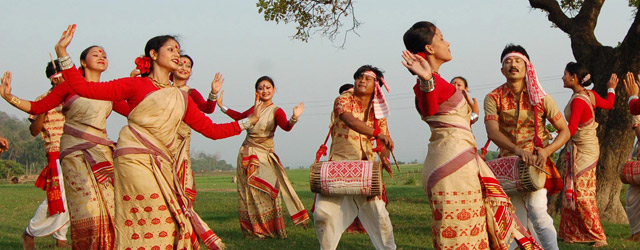Bohag Bihu is one of the most significant and important festivals in the Bihu calendar of Assam. It celebrates the commencement of harvesting season and is also regarded as the first day of the Assamese New Year. The significance of this festival is purely agricultural in nature. It is celebrated with great enthusiasm and joy throughout the state.
Bohag Bihu is the most important Bihu festival among the three Bihu festivals celebrated in the state. The festival is celebrated for seven days during the month of Bohag (Baishakh Month) which falls somewhere in the middle of the month of April. Bohag Bihu is also known as Rongali Bihu in many parts of the state. The name Rongali is derived from the word “Rong”, which means happiness and celebration.
The first day of Bohag Bihu is reserved for cattle and farm animals. On the first day, cattle and farm animals are taken to the nearby river or pond and given a through bath with a paste of turmeric and black gram. The old ropes tied to their legs are caste away and new ropes are tied. On this day, they are allowed to roam around freely in the field. This ritual is observed to thank the animals for helping them in the farm work. Prayers are offered to the Gods asking for a productive year ahead.
The next day of Bohag Bihu is known as Manuah (human) Bihu. On this day, people dress up in new clothes and gifts are exchanged. People visit their relatives and seek blessings from their elders.
The third day is dedicated for the Gods and that day is known as Gosai (God) Bihu. On this day people worship their household Gods and seek their blessing for a fruitful year ahead.
During the occasion of Rongali Bihu, people wear traditional attires made from muga silk and sing traditional Bihu songs and perform traditional dance. There is a band of male singers known as Husori, who visit each and every household and sing traditional Bihu songs in the courtyard. They offer their blessings to the household in return of some alms and gifts.









